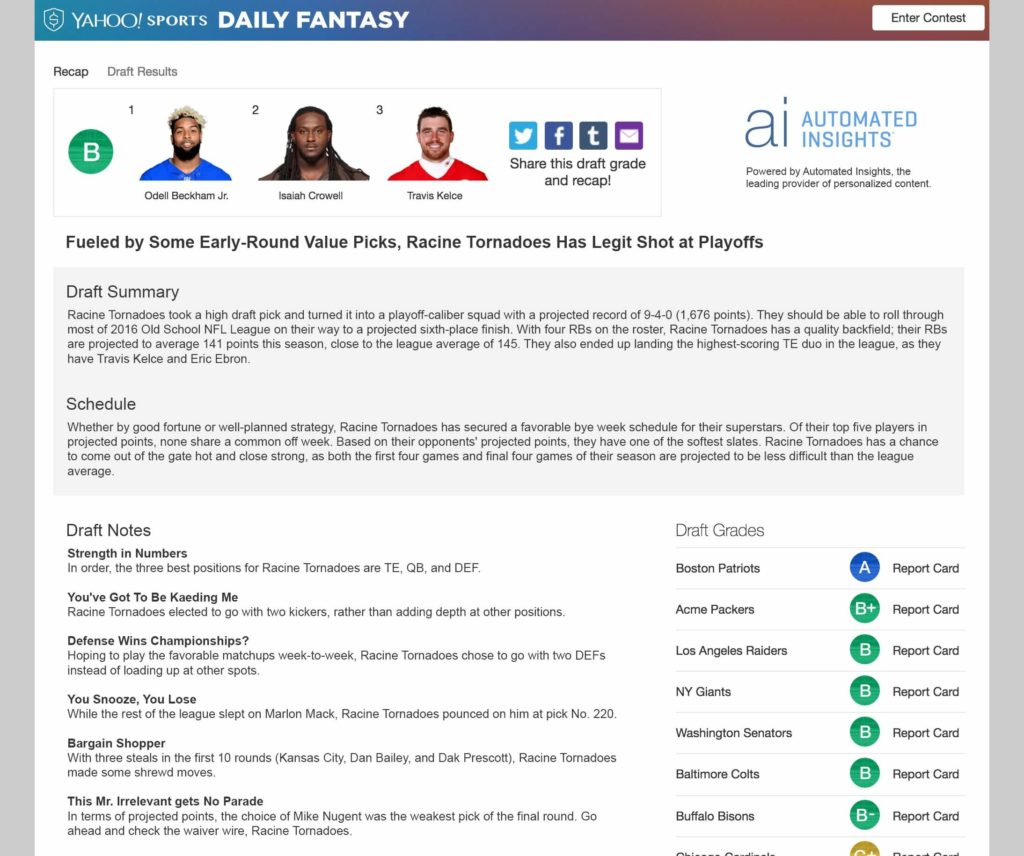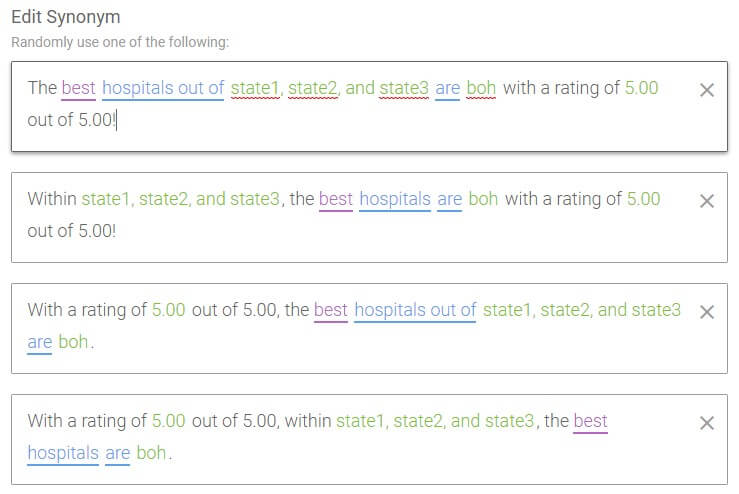The world of data has been exploding, and the process of capturing and analyzing data to drive business decisions is now the norm. This explosion has brought with it a rapid pace of innovation. Tableau Software is a giant in the visual-analytics space, Snowflake is on a rise in the data-warehousing business, and Amazon is more synonymous with web services than two-day shipping (almost).
I want to bring yet another wonderful advancement in tech to your attention—what Automated Insights is doing with their Wordsmith application.
Wordsmith in the Wild
Wordsmith is a software that takes your data and produces narratives using natural language generation. This solves problems such as limited data literacy and optimization of internal reporting, as well as more creative opportunities like generating monetizable internet content. Yahoo! Sports used Wordsmith to generate millions of Fantasy Football recaps based on individual users’ teams. These reports drove tremendous engagement to Yahoo!’s site, which is all monetizable internet traffic:

Another interesting use case involves the Orlando Magic’s season ticket program. In short, the Magic will exchange a ticket for points that can be redeemed for experiences like locker room tours or seat upgrades at a later game. This removes some competition for ticket sales when season ticket holders can’t make it to a game and decide to sell. However, sometimes the tickets aren’t likely to sell, so the Magic will send a personalized message to the holder telling them how many points they could receive instead. This has led to much more fan engagement and revenue, all of which was made possible by Wordsmith.
Building Narratives
The narratives are generated by a user-created template that consists of three components: Data, Branches and Synonyms. The Data component is the actual data being fed to the software, so a piece of the template might be “our net revenue for this week is [weekNetRevenue].” If the week’s net revenue was $1000, the template would automatically replace “[weekNetRevenue]” with “1,000.” The numerical formatting is all customizable, so you can add cents or take away commas or even automatically add a currency symbol.
The Branch component is a series of options that are selected by conditional logic. A simple example would be to include “increased” or “decreased” in your template based on a value in your data. You can also conditionally include separate sentences or paragraphs based on the data. Maybe you have a different report structure based on state—Branches can handle it.
Finally, there are Synonyms. These are the extra seasoning that can spice up a narrative. Essentially, you add several words or sentences to your template that are randomly selected on narrative generation. You might add “sizable” and “substantial” as Synonyms to “large” or even have several different sentence or paragraph structures. The level of customization that comes with Wordsmith is “incredible,” “breath-taking” or “phenomenal!”

The value of Wordsmith increases by how much effort one puts into creating these templates. Adding more nested Synonyms and Branches leads to more unique outputs and keeps the narratives fresh. Generating a fully customized report is very cool, but the real power of Wordsmith comes from the scale at which it can be implemented. You can provide real-time reports from fully customized templates based on your specific data delivered easily through their API. Instead of having an analyst look at the data and hand-type reports for a thousand clients each week, the data can simply be sent to Wordsmith and the narrative output forwarded directly to the client. Hundreds of hours reduced to a completely automatic process. The efficiency makes me giddy!
The Wordsmith of Tomorrow
The use cases for Wordsmith in today’s market are very cool, but what challenges will Wordsmith solve in the future? This is hard to say considering it’s impossible to guess what new data innovation will happen even a month from now, but it’s fun to speculate!
Wordsmith for Listeners
One thought comes from the shift from reading physical books to listening to audiobooks, as well as the rise in the podcast industry. Many audio programs are centered around reporting data-related news such as sports statistics or economic happenings. Imagine a podcast that is generated from real data being fed into Wordsmith and the narrative output being read from a less-robotic text-to-speech program. This solution takes the possible stories that come out of interesting sports or economic data and casts them right to a listener.
Wordsmith for Readers
Some people prefer to read rather than listen, so another idea would be the generation of a fictional narrative based on an individual reader’s preferences, bringing the natural-language generation of Wordsmith and machine learning together. If there were a dataset that represented the numerous aspects of a story and how a user rated those aspects, it’s feasible that a narrative could be generated from that information.
Taking that idea even further, a story could be generated while it’s being read based on the reader’s responses. This would require some innovative ways of measuring the reader’s emotions, but it’s an interesting idea nonetheless!

Value Now and Later
Automated Insights’ Wordsmith software has many use cases in today’s market, as well as unforeseen future use cases. As machine learning is more regularly implemented in the marketplace, more opportunities for Wordsmith will arise. We have more data and insights than we ever have, and those won’t stop increasing anytime soon. We already love the extra layer of insight Wordsmith provides, and I’m looking forward to the innovative applications of this technology that are just around the corner!

